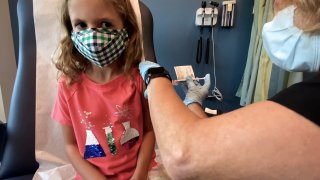
- A key FDA advisory committee on Tuesday recommended a lower dose of Pfizer and BioNTech's Covid-19 vaccine for children ages 5 to 11.
- The vote was nearly unanimous with 17 members backing it and one abstention.
- The endorsement was a critical step in getting some 28 million more kids in the U.S. protected against the virus as the delta variant spreads.
- The agency doesn't always follow the advice of its independent committee, but it often does.
A key Food and Drug Administration advisory committee on Tuesday recommended a lower dose of Pfizer and BioNTech's Covid-19 vaccine for children ages 5 to 11, a critical step in getting some 28 million more kids in the U.S. protected against the virus as the delta variant spreads.
The endorsement by the agency's Vaccines and Related Biological Products Advisory Committee will now be considered by the FDA, which could issue a final decision within days. The vote was nearly unanimous, with 17 members backing it and one abstention.
The agency doesn't always follow the advice of its independent committee, but it often does. Next week, a Centers for Disease Control and Prevention vaccine advisory group is expected to make its own recommendation. If it issues an endorsement and CDC Director Dr. Rochelle Walensky signs off, shots for young kids could begin immediately.
The Biden administration said it plans to distribute the doses as soon as it's authorized by the FDA and CDC, which is expected to come early next month. The administration said it's procured enough vaccine to inoculate all 28 million 5- to 11-year-olds in the U.S., and will distribute it in smaller dosing and with smaller needles to make it easier for pediatricians and pharmacists to administer to kids.
Get Tri-state area news delivered to your inbox. Sign up for NBC New York's News Headlines newsletter.
Money Report
Many parents say they are anxiously awaiting the vaccine's authorization with schools now open across the U.S. and the delta variant driving a surge in children's cases.
Children ages 5 to 11 account for roughly 9% of all reported Covid cases in the U.S., according to data presented to the committee by the FDA on Tuesday. The number of new Covid cases in kids remains exceptionally high, with more than 1.1 million child cases added over the past six weeks, according to the American Academy of Pediatrics.
Still, some parents and advocacy groups argue Covid vaccinations for children are unnecessary as studies show kids are less likely to experience symptoms from the disease even though they get infected at similar rates as adults.
Some committee members said Tuesday that vaccinating younger groups would help the U.S. move toward Covid's "endemic" phase, where the virus is still circulating but at lower levels than it is now. Others noted there are unknowns, such as the rate of myocarditis in young kids, but still emphasized that the benefits of the shots outweighed the risks. One member wondered whether they should issue a recommendation only for at-risk children.
"We don't want children to be dying from Covid, even if it is far fewer children than adults, and we don't want them in the ICU," member Dr. Amanda Cohn said before the vote.
Prior to the vote, Dr. Peter Marks, the FDA's top vaccine regulator, asked committee members to keep today's debate "civil," saying there were strong feelings on both sides.
"To be clear, today's discussion is going to be about the scientific data that are presented, and it's not about vaccine mandates, which are left to other entities outside of FDA," Marks said at the top of the meeting. "I ask that we keep our discourse today civil and focus on the science related to this issue so that we can get through a productive discussion."
Pfizer asked the FDA to authorize its vaccine for kids ages 5 to 11 on Oct. 7. The company published data that showed a two-dose regimen of 10 micrograms — a third of the dosage used for teens and adults — is safe and generated a strong immune response in a clinical trial of young children. It said the shots were well tolerated and produced an immune response and side effects comparable with those seen in a study of people ages 16 to 25.
Dr. Doran Fink, a deputy director of the FDA's division of vaccines, said Tuesday a "small army" of FDA staff worked around the clock over the last month to ensure the data on kids they were presenting today was as accurate as possible.
The staff of the FDA published an analysis late Friday, saying a smaller dosage of the Pfizer vaccine appears to be safe and highly effective in young kids. They noted the increased risk of myocarditis and pericarditis but said the benefits of the shots, including preventing severe disease, hospitalization and death, would generally outweigh the risk of the rare inflammatory heart conditions.
There have been 1,640 cases of myocarditis reported in people under 30 who received Pfizer's or Moderna's Covid vaccines as of Oct. 6, Dr. Mathew Oster, a CDC official, told the FDA's vaccine committee. Just 877 met the CDC's case definition for myocarditis. He added the agency hasn't seen increased rates of the condition among children ages 12 to 17.






